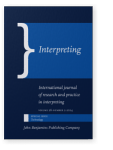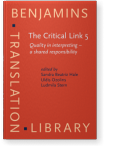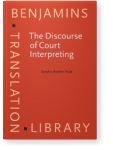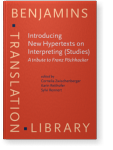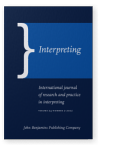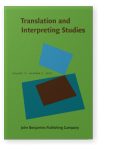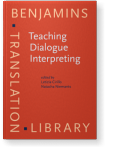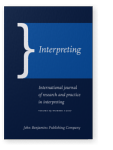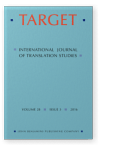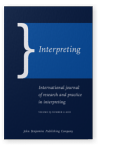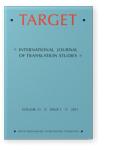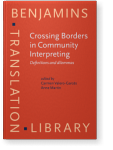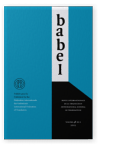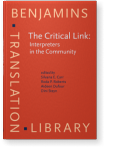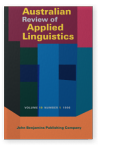Sandra Hale
List of John Benjamins publications for which Sandra Hale plays a role.
Journal
Titles
The Critical Link 5: Quality in interpreting – a shared responsibility
Edited by Sandra Hale, Uldis Ozolins and Ludmila Stern
[Benjamins Translation Library, 87] 2009. vii, 255 pp.
Subjects Interpreting
The Discourse of Court Interpreting: Discourse practices of the law, the witness and the interpreter
Sandra Hale
[Benjamins Translation Library, 52] 2004. xviii, 267 pp.
Subjects Discourse studies | English linguistics | Forensic & legal linguistics | Germanic linguistics | Interpreting | Pragmatics | Romance linguistics
2023 Exploring mixed methods in interpreting research: An example from a series of studies on court interpreting Introducing New Hypertexts on Interpreting (Studies): A tribute to Franz Pöchhacker, Zwischenberger, Cornelia, Karin Reithofer and Sylvi Rennert (eds.), pp. 22–43 | Chapter
Much of the research into community interpreting has used different methodologies in order to test or explore the same phenomena from different perspectives (Hale and Napier 2013). This approach is typically referred to as mixed-methods or multi-method research. Pöchhacker (2011) considers that… read more
2022 Does interpreter location make a difference? A study of remote vs face-to-face interpreting in simulated police interviews Interpreting 24:2, pp. 221–253 | Article
Remote interpreting has traditionally been the less preferred option when compared to face-to-face interpreting. But the recent pandemic has shifted the landscape, making remote interpreting the default in many, if not most, settings. Improved videoconferencing technologies have facilitated this… read more
2022 The effects of mode on interpreting performance in a simulated police interview Translation and Interpreting Studies 17:2, pp. 264–286 | Article
This study tested the effects of the consecutive and simultaneous interpreting modes in a simulated police interview, addressing four research questions: (1) Does the consecutive interpreting mode lead to more accurate interpreting than the simultaneous interpreting mode? (2) Do language… read more
2017 Chapter 10. Teaching legal interpreting at university level: A research-based approach Teaching Dialogue Interpreting: Research-based proposals for higher education, Cirillo, Letizia and Natacha Niemants (eds.), pp. 199–216 | Chapter
Legal Interpreting (LI) can be considered a specialised branch of Community Interpreting (CI). It encompasses interpreting in all legal settings, such as lawyer-client interviews, immigration-related interviews, police-related matters, tribunal hearings and court hearings and trials. In addition to… read more
2017 The effect of interpreting modes on witness credibility assessments Interpreting 19:1, pp. 69–96 | Article
Research into court interpreting has shown that interpreters can have an impact on the case in many different ways. However, the extent to which this occurs depends on several factors, including the interpreter’s competence, ethics and specialized training in court interpreting, as well as… read more
2016 “We’re just kind of there”: Working conditions and perceptions of appreciation and status in court interpreting Target 28:3, pp. 351–371 | Article
In considering the challenges for court interpreters, much of the previous research has concentrated on the linguistic aspects of the interpreting process. This paper explores the issue from the perspective of working conditions and professional status. One hundred and ninety-four practicing court… read more
2011 The positive side of community interpreting: An Australian case study Interpreting 13:2, pp. 234–248 | Article
Highlighting the negative aspects of a professional activity can be beneficial in identifying matters that need improvement. However, concentrating on the negative side only may lead to a lopsided view of reality. Much of what has been written regarding community interpreting in recent years seems… read more
2011 Interpreting accent in the courtroom Target 23:1, pp. 48–61 | Article
Findings from research conducted into interpreted court proceedings have suggested that it is the interpreters’ rendition that the judiciary and jurors hear and upon which they base their evaluations of witnesses’ testimony. Previous research into the effect of foreign accent of witnesses indicated… read more
2009 1. Introduction. Quality in interpreting: A shared responsibility The Critical Link 5: Quality in interpreting – a shared responsibility, Hale, Sandra, Uldis Ozolins and Ludmila Stern (eds.), pp. 1–10 | Article
2008 6. Controversies over the role of the court interpreter Crossing Borders in Community Interpreting: Definitions and dilemmas, Valero Garcés, Carmen and Anne Martin (eds.), pp. 99–121 | Article
Role definition in Community Interpreting in general remains a controversial issue. The different levels of development of the profession across the world, make consensus on this issue even more difficult. Different roles have been proposed and practised. However, a multiplicity of conflicting… read more
2002 The Interaction Between Text Difficulty and Translation Accuracy Babel 48:1, pp. 14–33 | Article
1997 The interpreter on trial: Pragmatics in court interpreting The Critical Link: Interpreters in the Community: Papers from the 1st international conference on interpreting in legal, health and social service settings, Geneva Park, Canada, 1–4 June 1995, Carr, Silvana E., Roda P. Roberts, Aideen Dufour and Dini Steyn (eds.), pp. 201–214 | Article
1996 Pragmatic considerations in court interpreting Australian Review of Applied Linguistics 19:1, pp. 61–72 | Article
The question of accuracy of interpretation of foreign language court testimonies is one of utmost importance to the court, to the witness and to the interpreter. The adversarial system uses language as its main weapon in the metaphorical battle, and cases are based on the oral evidence of their… read more
